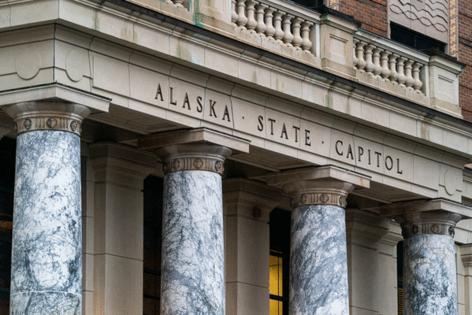Alaska House passes public pension bill, sending it to Senate
Published in News & Features
The Alaska House on Monday narrowly adopted a new pension plan for state employees, sending the bill to the Senate for consideration.
The bill passed in a 21-19 vote, dividing the chamber along caucus lines.
However, the Senate is unlikely to vote on its passage before the end of the regular session next week, Senate Majority Leader Cathy Giessel said on Tuesday.
"It looks like it will be a next-year bill," said Giessel, an Anchorage Republican who sponsored the legislation in the Senate.
If it becomes law, the measure would offer guaranteed retirement income to public-sector workers in Alaska for the first time since 2006, when lawmakers eliminated the state's defined benefit system in the face of a massive unfunded liability.
Lawmakers in 2006 instead adopted a defined contribution system that allows public-sector workers to contribute to individual investment accounts but does not guarantee any specific income in retirement. Several recent analyses have shown that the new plan leaves most public sector workers without enough funds to retire securely.
The plan has been particularly harmful for teachers, who do not contribute to Social Security and do not have access to a Social Security alternative offered by the state to other public-sector workers.
Since 2006, unions have warned with increasing urgency that the lack of a defined benefit option has made it difficult to recruit and retain workers in Alaska. Unions and lawmakers in the majority say the elimination of state pensions has led to dire teacher shortages that have forced some districts to hire staff from other countries on temporary visas, and state troopers and corrections officers are relying on overtime shifts rather than filling all posts.
The debate in the House over the new pension plan boiled down to a single question: What would it cost?
Proponents of the bill said it would ultimately save the state money by removing the need to pay tens of millions of dollars annually for recruiting and training new workers in a variety of sectors. Opponents said the pension system would shackle the state to payments it cannot afford, even as it is still paying off the unfunded liability it accrued for the pension system it closed in 2006.
The bill is expected to cost around $600 million in the coming 14 years, or roughly $40 million per year, according to House Majority Leader Chuck Kopp, an Anchorage Republican who is sponsoring the legislation.
However, Kopp said the state is currently spending far more than that on recruitment and retention bonuses, overtime pay and the cost of regularly training new workers to make up for high turnover.
"We are burning bonfires of money," Kopp said. "What we're doing now is staggeringly expensive."
Kopp and other proponents of the bill said the measure — which would allow current state employees in the defined contribution system to opt in to the new pension system — would save the state money by improving worker retention in the long haul.
Minority members said that despite the fact that the plan was designed to ensure that employees would increase their contribution rate if the pension plan became underfunded, it was impossible to ensure that the plan remained solvent in perpetuity due to a variety of factors, including the fast-ballooning cost of health care premiums in Alaska.
"We cannot predict the future," said Rep. Justin Ruffridge, a Soldotna Republican. "I want to support this bill. I really, actually do. I think that there are a lot of options in here that are good for people, but until we can have a hard conversation about the costs of this bill and really take a hard look at the levers that are in this bill, and until we can use some fiscal constraint around the cost over time, it's really hard to support this at this time."
The bipartisan majority in the Senate adopted similar legislation in 2023 but has yet to take a final vote a pension plan this year. Gov. Mike Dunleavy has not taken a position on the legislation. The regular legislative session must end by May 21, giving lawmakers limited time to consider the bill or amend it this year.
"We simply don't have time the rest of this year," said Giessel.
_____
© 2025 the Alaska Dispatch News (Anchorage, Alaska). Visit www.adn.com. Distributed by Tribune Content Agency, LLC.







Comments